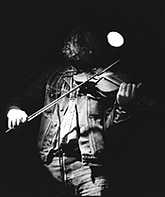

The problem with faux-historical bands is that ultimately their music boils down to one central message; that (a.) music can no longer teach us anything we don't already know, and that (b.) the only logical reaction to this realization is to retreat into familiar territory where at the very least, the tunes will be tolerable. As the Louisville, Kentucky quartet Freakwater displayed on their Thursday night show at the 'Sco, old time honky-tonk can be received and even enjoyed by a modern, educated, audience; providing that the participants feel no genuine feelings towards the genre being exploited.

Freakwater, whose members are dual vocalists and guitarists Catherine Erwin and Janet Beveridge Bean, upright bass player David Gay, and fiddle, banjo, and steel guitar player Max Johnston, rely far too much on the novelty of the music which they perform, and the viewer too often gets the unsettling feeling that they are merely bearing witness to what is essentially one big, unfunny, Jeff Foxworthy joke.
Freakwater played both originals Bean's vocals were often stirring, if somewhat detached, and the musical arrangements and performances were satisfactory facsimiles to their precursors.

The essential aspect missing from Freakwater is innovation. With such exciting music occurring everywhere this year, from Tortoise to The Dirty Three to DJ Shadow, one wonders about the relevancy and importance of covering a Townes Van Zandt song. It's a bit sad witnessing four very talented individuals investing so much time in an exercise which too often resembles parody.
On the other hand, Edith Frost, a transplanted Texan now living in Chicago, was a delightful opening act who moved the crowd with her strong vocals and simple guitar playing. Backed up only by an electric bass player, Frost sang beautiful, quirky songs with titles like "Blame You" and "Secrets," about love both found and misplaced.

Though Frost's instrumentation was sparse, her lyrics were quite expansive. She sings quite earnestly about meeting her dead ancestors, and desparately hoping that they won't beat her up. Such subject matter in lesser hands would seen anecdotal or even jocular, but with Frost they sound like the intimate confessions of one who has lived more fully than most.
Frost is an excellent addition to the self-consciously artsy Drag City label, which has been releasing some of the most oddly moving albums of the last five years. The label's shabbiest "B" Side is filled with more candor than Freakwater's twangiest love song. In a musical climate so accepting of throw-back bands, that fact will probably never come to light.
Copyright © 1997, The Oberlin Review.
Volume 126, Number 9, November 14, 1997
Contact us with your comments and suggestions.